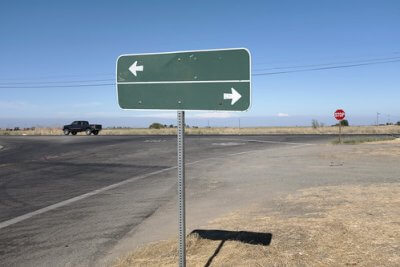What is an Existential Crisis? Are You Having One?

By: JD Hancock
by Andrea M. Darcy
Has a recent life change left you wondering, “What’s the point?” Or are you worrying about death, and if you’ve done enough with your life? You might be having an existential crisis.
What is an existential crisis?
The idea of an ‘existential crisis’ is not new. It’s been discussed for almost a century, connected to the rise of philosophical anthropology. It’s also linked to schools of thought like the humanistic movement, logotherapy, and, of course, existentialism.
Existentialism believes we determine our life’s journey, and the meaning our life has, with our freedom of choice. It’s up to us to make rational decisions, even if the world around us seems anything but.
An ‘existential crisis’ refers to a period of life where we lose sight of life’s meaning, and feel powerless to create any. Emmy van Deurzen, credited with bringing existential psychotherapy to the UK, explains an existential crisis as:
“…some specific circumstance in which we experience our basic sense of survival, security, identity or significance as being threatened. Such existential threats may be of a physical, social, emotional or spiritual nature, and may be directed toward one’s self, others, the world in general or the ideas and perceptions we live by. They shock and shake us out of our sense of safety and complacency, forcing us to question and doubt our most deeply held beliefs or values.”
Signs you are having an existential crisis
Like any form of crisis, you can:
- feel unable to be yourself
- have erratic moods
- show signs of anxiety and/or depression
- feel disconnected from people around you
- find it hard to keep up with your day-to-day life.
When it is an existential crisis, you will also:
- find your thought patterns changed to constantly asking ‘big’ questions
- worrying if you have any purpose
- wanting to know what life means
- obsessing about death, dying, and the afterlife
- worrying if you have any purpose
- struggle to find satisfying answers to your big questions
- feel frustrated and sad when you can’t find answers
- feel indecisive and confused as to what to do next
- possibly feel it’s best to end life entirely.
Why am I questioning everything and anything?
An existential crisis can be the result of a period of depression. Your endless ruminating over the past leads to despair and questioning the point of life.
But often, an existential crisis will happen during or after a life change, such as a:
- major illness
- landmark birthday
- redundancy
- bankruptcy
- gender reassignment
- bereavement
- loss of religion
- time of too much responsibility.
How is an existential crisis different than a midlife crisis?
Age and facing our mortality can trigger an existential crisis. So you might have one along with your midlife crisis.
The difference is that a midlife crisis is about feeling you haven’t done enough with your life. It leads to a flurry of action. The cliche red sports car or trip around the world. Or things like a sudden career change, or leaving a relationship.
An existential crisis is about feeling that life has no meaning. It leads to deep questioning. You would be more likely to buy a philosophy book, or find yourself trying a spiritual path, then to rush off to buy that sports car.
How is an existential crisis different to depression and anxiety?
Depression and anxiety, in and of themselves, often have their roots in the past. Unstable childhoods, or childhood trauma, lead to the unhelpful patterns of thinking and relating that drive these mental health issues.
An existential crisis is more likely to be rooted in recent life change or trauma.
But there is overlap. Many people experience depression and anxiety during an existential crisis. It leaves you worried about your future, and anxiety is fearful and increasingly illogical thoughts about the future. A crisis also has you ruminating over the past and what you failed to do that could have given life purpose. Ruminating is the thought pattern of depression.
So whereas depression and anxiety can and often do exist independently, an existential crisis generally involves some anxiety and/or depression. And depression can lead to an existential crisis.
Why losing sight of our purpose can be a good thing
If we don’t question things, we don’t find new and more useful answers, and better ways forward. To quote Emmy van Deurzen once more —
“These disorienting and anxiety provoking periods of crisis are perceived as both a perilous passage, and an opportunity for transformation and growth.”
What types of therapy can help me navigate an existential crisis?
Existential psychotherapy would of course be a perfect fit. Other types of therapy that can help you look at what brings life meaning for you, personally, are transpersonal psychotherapy, which has a spiritual aspect, and Jungian therapy, with it’s focus on wholeness and self-transcendence.
Ready to find what gives your life meaning and purpose? We connect you with highly experienced psychotherapists in London who can help. Or use our booking platform to source UK-wide therapists and online counsellors you can work with from anywhere.
 Andrea M. Darcy is a mental health and wellbeing expert with training in person-centred counselling and coaching. She often writes about trauma, relationships, and ADHD, and advises people on how to plan their therapy journey. Find her on Instagram @am_darcy
Andrea M. Darcy is a mental health and wellbeing expert with training in person-centred counselling and coaching. She often writes about trauma, relationships, and ADHD, and advises people on how to plan their therapy journey. Find her on Instagram @am_darcy






